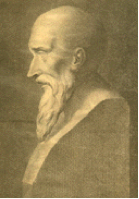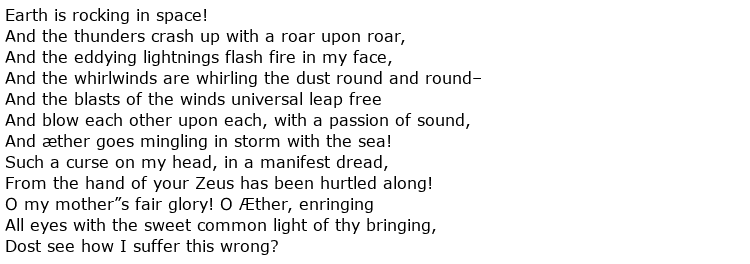 Aeschylus was the first exponent of the dramatic form now known as “The Greek Tragedy”. It has been said that the idea of writing tragedies came to him in a dream when ordered to do so by Dionysus, the God of the Grape Harvest. This occurred during an episode where the young Aeschylus was sent out from the city to watch grapes ripening on the vine, no doubt to enhance the young boy’s grasp of mysticism and the power of Mother Earth. The dream was so vivid that he started writing his first tragedy the following morning and completed it with ease.
Aeschylus was the first exponent of the dramatic form now known as “The Greek Tragedy”. It has been said that the idea of writing tragedies came to him in a dream when ordered to do so by Dionysus, the God of the Grape Harvest. This occurred during an episode where the young Aeschylus was sent out from the city to watch grapes ripening on the vine, no doubt to enhance the young boy’s grasp of mysticism and the power of Mother Earth. The dream was so vivid that he started writing his first tragedy the following morning and completed it with ease.
He was born in the year 525 BC in Eleusis, a city some 18km north west of Athens. He was the son of Euphorion who has been described as a scion of a Eupatrid (a noble family of the Attican region of Greece). As well as growing up with a burning ambition to be a writer he also distinguished himself in battle. He fought well at the battle of Marathon and others and it could be said that he actually took more pride in his military accomplishments than his dramatic writing. This suggestion is borne out by the following self-penned inscription on a monument erected in his honour in the town where he died (Gela, Sicily):

At this time theatre was a new and evolving art and was generally performed by a single actor surrounded by a circular chorus of singers and dancers in the “orchestra”. The single actor interacted with them, delivering his lines in a choral poetic style, usually wearing different masks to portray several characters. Aeschylus sought to change all of this and started by introducing a second actor to the stage and involving the chorus more in the action of the play. Dramatic examples of the effects of such involvement were when the Furies were seen to take to the stage in such a violent manner that women in the audience would miscarry their unborn babies. Whether such events ever took place is open to conjecture but the story portrays the way in which dramatic productions were changing. Those that were once peripheral figures were now thrust right into the heart of the action.
Aeschylus wrote over 90 plays but only 7 survived and one, called The Persians, tells the story of the Battle of Salamis and was written from personal knowledge of this conflict (both he and his brother fought there). What is notable though about this piece of dramatic work is the inclusion, for the first time, of a “ghost scene”. Another, Prometheus Bound, is about the mythical Prometheus who, it was said, was the world’s first humanitarian. Without seeking the approval of the Gods, he bestows the gift of fire to mankind and, for this, he is punished by being shackled to the top of a Caucasian mountain peak where the Olympian God Zeus bombards him with fire and tempest. He suffers these trials stoically, as related below in the poem Prometheus Amid Hurricane And Earthquake:

In these ancient times it was generally believed that any act of wickedness was instigated by the Gods and Aeschylus, in his writings, tried to deal with such events as incest and patricide. He believed that a lack of moral fortitude was responsible for such acts and that men should take more responsibility for their actions rather than “blaming it on the Gods”. Perhaps such revolutionary thinking led him to leave the country of his birth and he spent the last years of his life in Sicily.
Such was the impact of the writing of Aeschylus that he has been quoted often. During a presidential campaign in 1968 Robert F Kennedy used words from the play Agamemnon:

It was at the time of the assassination of the black human rights campaigner Martin Luther King, Jr and Kennedy went on to say that:

Aeschylus died in the year 455 BC at the age of 70. It is likely that his death was from natural causes but there is a story that an eagle dropped a tortoise from a great height onto his bald head, mistaking it for a rock.

